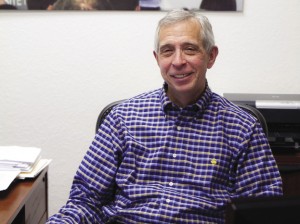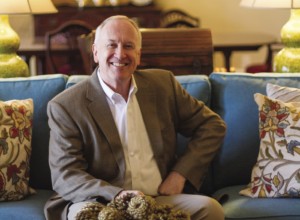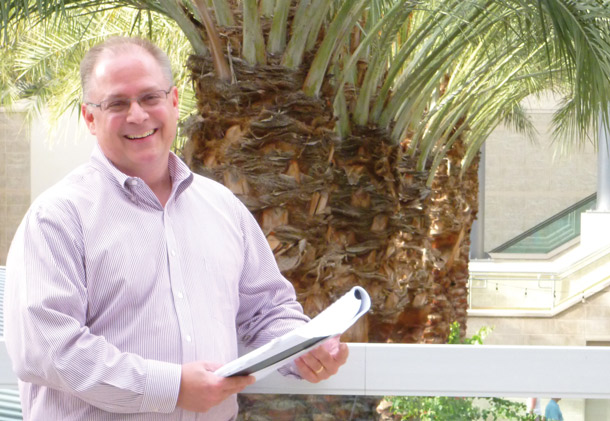They all have last names that flag them as possibly having Swiss-German-Mennonite roots – Buckwalter, Kauffman and Yoder – and they all majored in business administration. What else do John Buckwalter ’88 in Phoenix, Arizona, Kermit Kauffman ’79 in Tampa, Florida, and Keith Yoder ’77, in Atlanta, Georgia, have in common? Answer: They all were raised in small farming communities, and all ended up being top financial managers in major city-based corporations that had nothing to do with farming. Here are their stories.
JOHN BUCKWALTER
John Buckwalter’s father owned a small car dealership in John’s hometown of Wellman, Iowa (pop. 1,100), plus another one in Washington, Iowa. “My friends at Iowa Mennonite School viewed me as a city slicker,” he recalls with amusement. He wasn’t, but he wanted to be. After acing the CPA exam at the end of his senior year at EMU(in the 1980s, you could get a CPA without 150 hours of coursework), Buckwalter packed everything he owned into his Chevrolet Cavalier and headed to Phoenix, where his older sister was living. He started as a roofer in the broiling summer sun of Phoenix. His sister, who was a client of the accounting firm known as Deloitte, passed his résumé to the firm and, amazingly (he says, as he looks back on matters now), he was called in for an interview. Normally, a Big Four accounting firm would have finished its recruiting a year earlier and then from the so-called elite universities with undergraduate and graduate accounting programs. But one of Deloitte’s young recruits for the Phoenix office backed out on his commitment to arrive in the fall, suddenly leaving an opening. Buckwalter had straight As, but his grades were from an “unproven school.” To the surprise of Deloitte’s bigwigs, however, he had scored in the top three in Virginia on the CPA exam he took the previous May and soon would receive the Elijah Watts Sells Award, a highly prestigious national honor from the American Institute of CPAs (in 2011, it was conferred on 37 takers of the CPA exam out of 90,000 candidates). Buckwalter credits his then-EMC accounting professor, Ronald Stoltzfus, for putting his students through “killer mid-terms” that lasted four hours, followed by equally arduous and long final exams. With such rigorous preparation, Buckwalter did not find the CPA exam to be unduly difficult. “Ron certainly influenced my career,” Buckwalter says. Buckwalter started as a “worker bee,” auditing financial statements, but quickly moved to taxes. The system demanded much of its lower-level accountants. “You are trying to make a lot of people happy while doing multi-tasking. It’s rough and tumble at the bottom,” says Buckwalter. As one rises in the firm, you shed the number of bosses you report to, Buckwalter explains, but ultimately it is a pyramid scheme, whereby more than 95% of those originally hired will have no chance to become a partner in the firm. “A lot go to beauty school,” he says wryly, “but few get chosen. Would I have been chosen? That’s one of the questions in my life that I’ll never have an answer to.” In 1998, Buckwalter got a call from a recruiter who told him that Starwood, a rapidly growing company in the hospitality space, would be interested in interviewing him. Today Buckwalter is Starwood’s vice president of corporate tax, overseeing 10 staffers and consulting with external lawyers and accountants. He estimates that he puts in 12 hours a day, 9 a.m. to 9 p.m., organizing “defense” by managing IRS audits and “offense” by finding ways to reduce the taxes paid by Starwood. Of the $9 billion in assets held by Starwood,1 Buckwalter has done “creative tax planning” – always within the law – to see that taxes do not have to be paid on all of the billions in asset transactions. “I would never want to take a position that would be embarrassing if discovered,” says Buckwalter. Buckwalter smiles at the recollection that some folks in Wellman wondered why he didn’t simply step into his father’s car business, as his brother did. “One of the things I am most proud of is that I came out here with nothing but what I learned from my parents and the education they supported me through,” he says. “I have earned everything here the hard way.” His father was influential, in teaching him how to handle people – by elevating them and not tearing them down, and treating customers fairly, Buckwalter says. “I believe good things will come my way if I build up my team,” he says. In his department, “we invest in each other and support each other,” in contrast to the counter-model in some parts of Corporate America, where blame is liberally assigned and people often are torn down. Buckwalter and his wife, Pam (a former schoolteacher), have an 11-year-old daughter, Kamryn, and an 8-year-old son, Jack. The family attends Scottsdale Bible Church in the eastern suburbs of Phoenix.
KERMIT KAUFFMAN

On a farm in Kalispell, Montana, grew up five Kauffman brothers. All of them headed east for a year or more at either Eastern Mennonite High School or College. N. Leroy ’77 was first, followed by Kermit and Galen, both ’79 grads, and Marlin, class of ’88. Jerry attended the high school, graduating in 1981 and eventually marrying Mary Beth Yoder, a ’77 nursing grad. Only Marlin returned permanently to the family farm. Two of the brothers, Kermit and Leroy, chose financial careers, with Kermit passing the CPA exam and joining the accounting operation of Media General in Richmond, Virginia, and Leroy becoming an academic (MBA at U. of Montana, PhD at Ohio State), who now teaches accounting, finance and economics at Western Carolina University. Media General turned out to be a great place for Kermit Kauffman to go fast and far. By global standards, it was a medium-sized multi-media company controlled by the Bryan family of Virginia. From its base of two daily newspapers in Richmond, Media General acquired about 60 more newspapers. It also expanded into broadcast television, starting with WFLA-TV in Tampa, Florida, and growing to 18 TV stations, mostly in the southeast United States. In 1994, Media General embraced the Internet business, partnering first with Prodigy and then starting tbo.com, in Tampa. In 1986, seven years after joining Media General, Kauffman was named CFO of its chain of California weeklies. In 1990, Media General moved Kauffman from Anaheim, California, to Tampa, where he started as controller of The Tampa Tribune and progressed to vice president of administration, in charge of the finance and information technology functions for The Tampa Tribune, WFLA-Newschannel 8, and tbo.com, the online operation for the news outlets. “We were an industry leader with what we called convergence – online, broadcast and print operating as one,” Kauffman says. “We had one finance department and one IT department, and our news and advertising people worked closely together.” As anyone who has paid attention in the last decade knows, a workable financial model for delivering news in the Internet age has not yet been found. Kauffman found himself in a difficult position: “It was tough, especially in 2003 and 2004 when you could see that advertising wasn’t going to bounce back.” Automotive advertising was down, real estate advertising practically disappeared, and recruitment went totally to the web. “In the 90s, we had a downturn, but the economy and the advertising market came back,” he says. “In the early 2000s, the problems were more systemic.” Kauffman was part of implementing several rounds of layoffs at the Tribune. There was no choice – the company had to stay profitable – but the layoffs were troubling. Given the trend lines, Kauffman sold his Tribune stock and retired in 2007. “I was lucky enough to have that option, but it ended up being smart to do.”2 Not ready to let him go, Media General asked Kauffman to work as a consultant in advance of Super Bowl XLIII, held in Tampa in 2009. Media General was a sponsor of the local host committee. Kauffman was put in charge of handling the local print and television interests for the NFL event. He chuckles at the recollection that he had 165 choice tickets to the Super Bowl in his office the weekend before the game, all destined to be used to enhance ties between Media General and its advertisers. Yet, “the best part of that gig was the fact that I was able to take one of my brothers and a nephew to the game.” Outside of his paid work, Kauffman served for 15 years on the board of a Tampa shelter for victims of domestic violence. When their CFO left unexpectedly, he filled in as its interim CFO for the last nine months of 2009. He remembers the experience as particularly eye-opening regarding the tenuousness of budgets that depend on government and private grants. “There were times when I wondered if we could make payroll or cover the electric bill. But we always managed to make it happen.” For fun, Kauffman and two friends formed an adult kickball league in 2010 for which they charged $65 per participant for an eight-week season plus a final tournament. When Kauffman extricated himself from this venture in January 2013, the league was attracting 600 players per season and its revenues were approaching $100,000 per year. “Your biggest challenges in that business are lighted fields and enough parking,” he says. (For more info, see http://kickballsociety.com/) Kauffman had other things he wanted to do with his time, like get ready for a half-marathon in New York City in March 2013. He’s done 11 full marathons, including ones in Boston, Berlin, Paris and New York. Recently Kauffman made what will likely be his last career move. He became CFO of GSP Retail (gspretail.com), a family-owned business in Tampa employing 380. The company is a specialty signage and technology company, producing signage for the convenience-store industry across the country. GSP also develops and markets software to help its customers manage their store layouts, merchandising and signage installation. “I’ve been asked if I got bored [being retired],” he says. “Not at all, but it just seemed like something I would enjoy.” Reflecting on his work life, Kauffman says: “I think I’ve gotten where I have because I had a good grounding in ethics early on. I learned from my parents that it’s important to do things right. If it’s worth doing, it’s worth doing well. “I have a strong sense of right and wrong. If you cut corners or bend the rules, it will come back to haunt you. You don’t want to regret what you’ve done; you need to feel good about doing things the way you did.”
KEITH J. YODER

“Growing up on a dairy farm, I learned that hard work and working as a team brought success,” said Keith J. Yoder ’77, thinking about the 350-plus acres on which his great-grandfather settled in west-central Ohio. By the mid-1920s, that land had been sub-divided into three farms for his children, one of which was eventually farmed by Yoder’s father and mother for more than 50 years outside the town of West Liberty. “Ultimately, I thought there were options that suited me better than working on the farm, but what I learned about hard work and teamwork would be integral to success in any career,” Yoder recalls. He headed to Hesston College in Kansas for two years, and then transferred to EMU. As a business administration major, Yoder thought the health-care arena “could provide value” and would fit well with his Mennonite background. On a return visit to EMU he met and later married Mary Claire, a graduate of James Madison University (JMU) whom he met when she managed EMU’s public radio station, WEMC. Mary Claire was from the Tidewater area, so the couple felt a tug towards eastern Virginia. After earning an MBA from JMU (and having taken most if not all the accounting courses EMU offered), Yoder got an entry-level accounting job at Richmond Memorial Hospital. By 1981, Yoder had passed his CPA exam, and was director of finance for the Long Term division of Sentara Healthcare Inc. in Norfolk, a large not-for-profit healthcare system. “The skilled nursing side was growing. We had five or six nursing facilities at that time.” In 1992, Yoder accepted an offer to be CFO and vice president of Evergreen Healthcare Inc., headquartered in Indianapolis. “By late 1994 [when he was managing a financial staff of 55], we knew we had to get really big or merge with somebody else. At the time, we had 73 nursing homes and $200 million in revenues.” Evergreen merged with GranCare – with Yoder aboard as treasurer and controller – yielding a system of 230 facilities and $650-$700 million in revenues. “I was doing a lot of traveling to many locations, including Wall Street in New York, to raise capital. It could give you a false sense of importance because the reality was you could be one transaction from merging yourself out of a job,” Yoder says. “It was an environment which required us to keep completing transactions – keep growing or selling – to maintain your stock price and to keep your investors happy.” This was the late 1990s, Yoder notes, when the market demanded “growth or get out.” “It was an interesting time, especially for someone from my background.” After a pause, he adds, “You could get pushed to places you didn’t want to be, but my background provided the understanding to do things the right way.” Over an eight-year period, Yoder played a leading role in enabling the companies in which he was involved to grow their revenues from $100 million to $1 billion, derived from nursing homes, assisted living facilities, institutional pharmacy and home-health operations. From 2003 to 2011, Yoder was based in Atlanta and Columbus, Ohio, working as CFO for Atrium Centers LLC, which he helped grow from 13 to 43 nursing care facilities, with $220 million in revenues. Family and friend considerations, along with a start-up opportunity, weighed heavily in a decision by Keith and Mary Claire to settle in Atlanta in 2011– where they had lived as a family from 1995 to 2007 (when he worked for GranCare and then as executive vice president of a dental and vision insurance company, with $240 million in revenues). This is where two of their adult children had settled, and where Keith and Mary Claire felt most at home. Today, Yoder is a consultant bringing to the table his extensive experience with financial reporting, regulatory compliance, risk management, mergers and acquisitions, investor presentations, systems conversions and integrations, and operational and capital budgeting. “When I left EMC and JMU, I never had any idea that I would have the opportunities that I’ve had,” he says. “I was often in the right place at the right time and utilized those opportunities to share what I had learned along the way, beginning with what my parents showed me – hard work and teamwork – on the farm. I have enjoyed the experience of growing companies, getting the right systems in place, and building great teams. That [team building] has turned out to be one of my strengths.” — Bonnie Price Lofton, MA ’04 1. Starwood is the largest luxury hotel owner and manager in the world, with hotels operating under the Sheraton, Le Méridien, Westin, W, and St. Regis brands, among others. Rivaled only by the Marriott Corporation, Starwood owns or manages 1,100 hotels in 100 countries, with 170,000 employees, yielding $6 billion in annual revenues. 2. When Warren Buffet announced in May 2012 that he was paying $142 million in cash to acquire most of Media General’s daily newspapers, he declined to include The Tampa Tribune in his group of 25 acquisitions.
